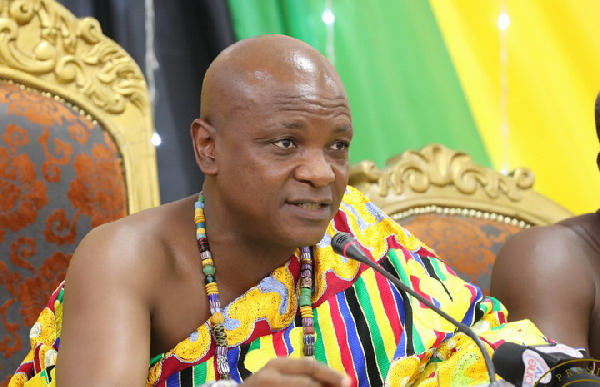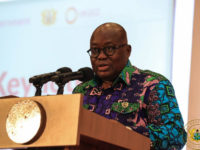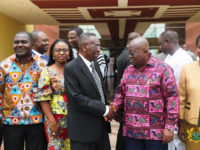
Ghana Politics News-Togbe Afede XIV, President of the National House of Chiefs, has said the ongoing work towards the creation of new regions in the country is posing a threat to peace and unity.
This he said was in view of the petitions he received from the chiefs of Lolobi and Akpafu in the Volta Region who have sworn never to join the new Oti Region.
“From the chiefs of Chereponi and Dagbon in the Northern Region and from people who are outside the area targeted for new region, who feel entitled to vote in the referendum”.
Togbe Afede XIV said this when he addressed the General Meeting of the Volta Regional House of Chiefs at Ho.
He revealed how he personally offered advice both privately and publicly on the regional reorganization process, but was sadly ignored and misreported, leading to him being insulted.
“The views I expressed and the pieces of advice I offered when members of the Commission of Enquiry visited the National House of Chiefs on April 18, 2018, were selectively reported to give a certain impression”.
Togbe Afede XIV, who is also the Agbogbomefia of the Asogli State said in that meeting, he emphasized the need for the Commission of Enquiry to work as a fact-finding commission as opposed to one working for the creation of new regions, in order to avoid suspicion of bias. He said he was critical of the manner which the Commission conducted its hearings, and advised the Commission to do an honest job without fear or favour in compliance with the letter and spirit of the constitution.
“In reporting on my speech at the Asogli Te Za Durbar, the Daily Graphic stated that I “asked that no group of people must oppose the ongoing process to create new regions”, and that “the move ought to be respected by all and sundry in the interest of the peace and unity of the country,” which I did not.
Togbe said, as a leader, “I cannot be an apathetic spectator in important matters that affect the peace, unity and development prospects.”
The President of the NHC said the framers of the law anticipated that there could be the need to alter, in one way or another, the regional composition of this country, thus, the provisions of chapter 2 of the constitution, which laid down clear democratic procedures for making the relevant decisions.
He noted that in their wisdom, tough conditions were provided in order to make the creation of regions, alteration of boundaries or merger of regions difficult, unlike what has been happening in the cases of new constituencies and new districts.
Togbe Afede XIV said it was true that some people from four of the regions who desired to have separate regions have sent various petitions to government over the years and was also true that various politicians have made various promises accordingly.
According to him, the President, as required by the constitution, and acting in accordance with the advice of the Council of State, constituted a commission of inquiry, comprising eminent persons, to inquire into the demands and to make recommendations on all the factors involved.
He said the constitution provides that: “where the commission found that there is the need and a substantial demand for the creation of new regions, it shall recommend to the President that a referendum be held, specifying the issues to be determined by the referendum and the places where it should be held.”
The Agbogbomofia of the Asogli State said, in performing its mandate, the Constitution enjoined the commission to make a full, faithful and impartial inquiry into the matters specified in the instrument of appointment.
He stated that he has not seen a copy of the commission’s report, and was not aware of its publication, adding that, reports suggested that the commission has recommended the creation of more regions.
Togbe Afede XIV said Ghana’s constitution provides, among others, that there should be a referendum to approve: the creation of a new region; the alteration of boundaries of regions, whether or not the alteration involves the creation of a new region; and the merger of regions.
He said it was obvious that the creation of new regions will result in the alteration of existing boundaries and that if one of the issues to be decided in such a referendum was the boundary of a new region, then it “would be difficult to see how voting could be limited to people within an assumed boundary.”
He said the concentration of the commission’s work on the areas from which petitions came betrayed an early assumption that voting would take place in those areas only, adding that, “If this thinking holds, then we should prepare ourselves for a flood of requests for and promises of new regions.”
According to him, under Ghana’s constitution, a small group of people cannot decide on the partitioning of an entire region, stating that the wrong examples of Eritrea, South Sudan and Trans-Volta Togoland, were being quoted to justify the illegality, totally disregarding Ghana’s own law.
He said the framers of Ghana constitution “have done a good job in giving us a clear road-map for the creation and alteration of new regions and boundaries respectively, and we must not bastardize it, but respect it in the interest of peace and unity.”
Togbe Afede XIV reminds Ghanaians that “the most important desire of our people was development and that there cannot be development if there was no peace, therefore, it is important that we all work towards strengthening the peace and unity of our country in order to facilitate the development that we crave.”
He made a passionate appeal to both those who are for and against the creation of new regions, politicians of the ruling party, as well as those outside, and all Ghanaians, to uphold the truth for the sake of our country, Ghana.”
What do you think about this piece? Share your comment in the comment thread and share the story using the social media buttons above. Thank you.

